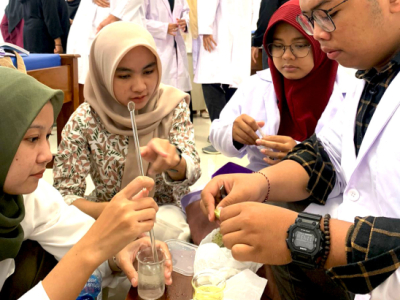UNY provides an opportunity to study scientific traditional medicare

Traditional medicine must be recognized as having a special place in Indonesian culture and tradition. However, learning traditional medicine in a structured and tested manner is not easy. Therefore, UNY through the Faculty of Vocational Studies officially opened the Diploma of Indonesian Traditional Medicine (PTI) program as an answer to the public's interest in learning and preserving Indonesian traditional medicine.
"Graduates of the Diploma of Indonesian Traditional Medicine will have the competencies and skills needed to become skilled health workers and entrepreneurs in the field of Indonesian traditional medicine. Students can choose to focus on therapeutic massage, exercise therapy, plant cultivation, herb processing, or entrepreneurship. Through the learning process guided by experts, we want to help improve the quality of life of the community through effective and efficient traditional medicine," said the coordinator of UNY's Indonesian Traditional Medicine Study Program, Prof. Ali Satia Graha.
There are several main courses in this program including Basics of Traditional Medicine, Herbal Botany, Infant and Early Childhood Massage Therapy, and Acupuncture. "Basics of Traditional Medicine discusses alternative medicine methods that are carried out using traditional methods, such as acupuncture, massage, herbs, and energy therapy," said Ali. Topics covered include basic principles and concepts, types of treatment, their use to treat diseases and medical conditions, safety, effectiveness, and ethics. This course is important for students who are interested in the field of alternative medicine and can help patients in choosing the right treatment.
Herbal Botany is a branch of botany that studies medicinal plants or herbs and their applications in human medicine and health. Herbal botany includes the study of the chemical and biological properties of medicinal plants, as well as the traditional and modern use of medicinal plants for the treatment of disease. Acupuncture is a course that studies traditional Chinese medicine techniques that use needles to stimulate certain points in the human body. This course discusses the basics of acupuncture theory, principles of diagnosis, needle application techniques, and the use of additional therapeutic methods such as moxibustion and acupuncture massage. In addition, students will also learn about ethics and clinical practice in acupuncture practice. This course can provide a deeper understanding of alternative medicine and traditional methods in the medical world.
In particular, Ali Satia Graha said that Infant Massage Therapy uses massage techniques in the form of scouring and stroking which are combined when performing massage. "Baby massage is a massage performed on soft tissue manually, namely by holding, moving, and or pressing on the body to have a positive influence on the development of the baby," said the Professor of the Faculty of Sport and Health Sciences UNY.
Massage stimulation is a combination of multi-modal stimulation, namely touch (tactile) and motion (kinesthetic) performed by parents, health workers, or other family members. Furthermore, at the same time, parents also perform auditory stimulation (hearing, by inviting the baby to talk during the massage), visual stimulation (vision, by making eye contact during the massage), and others. This course aims to provide students with an understanding of the physical and mental development of children, how to recognize physical and mental problems in children, as well as massage techniques and other therapies that can help relieve these problems. During the practice, students will be taught infant and child massage techniques, therapeutic massage, abdominal massage, and full-body massage. (Author: Dedy,
Editor: Sudaryono, Tj.Lak)

